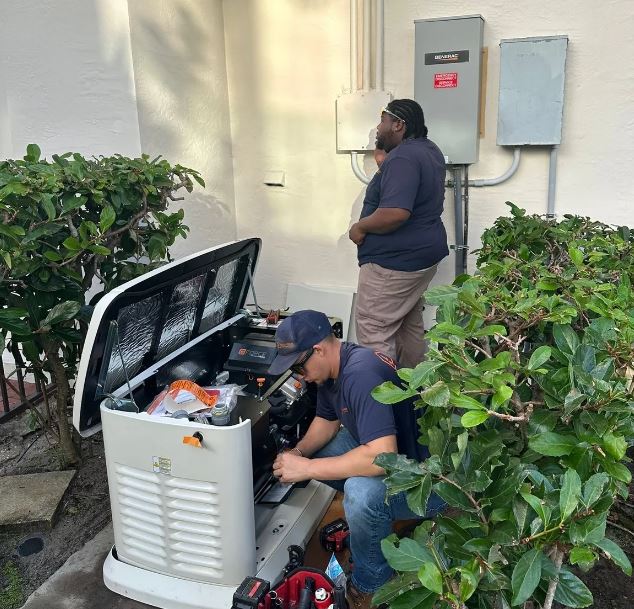Need a Generator for Your House? Here Are Some Buying Tips

Power outages can be frustrating and even dangerous, especially if they last for hours or days. Whether caused by severe weather, grid failures, or maintenance issues, losing electricity means no lights, no heating or cooling, and spoiled food. That’s why many homeowners invest in a backup generator.
But with so many options available, how do you choose the right one? This guide will walk you through everything you need to know before buying a generator for your home.
Why Do You Need a Home Generator?
Before diving into the buying process, it’s important to understand why a generator is a smart investment:
- Keeps Essential Appliances Running – Refrigerators, medical equipment, and heating/cooling systems stay operational.
- Prevents Food Spoilage – A prolonged outage can ruin perishable food.
- Ensures Safety & Comfort – No more stumbling in the dark or suffering extreme temperatures.
- Protects Home Offices – If you work from home, a generator keeps your Wi-Fi and devices running.
- Increases Home Value – Backup power is an attractive feature for potential buyers.
Now that you know why you need one, let’s explore how to pick the best generator for your home.
Types of Generators for Home Use
There are three main types of generators: portable, inverter, and standby. Each has its pros and cons.
1. Portable Generators
✅ Pros:
- Affordable (typically 500–500–2,000)
- Can be moved around
- Good for short-term outages
❌ Cons:
- Require manual setup
- Run on gasoline, which must be stored safely
- Not ideal for whole-house power
Best for: Occasional use, camping, or powering a few essential appliances.
2. Inverter Generators
✅ Pros:
- Quieter than traditional portable generators
- More fuel-efficient
- Produces clean power (safe for electronics)
❌ Cons:
- Higher cost than basic portable models
- Limited wattage (usually under 4,000 watts)
Best for: RVs, small homes, or sensitive electronics like laptops and TVs.
3. Standby Generators (Whole-House Generators)
✅ Pros:
- Automatically kicks in during an outage
- Powers the entire home
- Runs on propane or natural gas (no refueling needed)
❌ Cons:
- Expensive (3,000–3,000–10,000+)
- Requires professional installation
Best for: Homes in areas with frequent or long power outages.
Key Factors to Consider Before Buying
1. Power Output (Wattage)
Generators are rated in watts. To determine the right size:
- Calculate your essential appliances’ wattage (fridge: 600W, furnace: 800W, etc.).
- Add a buffer (at least 20% extra capacity).
Rule of Thumb:
- Small (1,000–3,000W): Lights, fridge, phone charging.
- Medium (3,000–7,000W): Adds HVAC, microwave, TV.
- Large (7,500W+): Whole-house power.
2. Fuel Type
- Gasoline: Easily available but goes bad quickly.
- Propane: Stores longer but requires tanks.
- Natural Gas: Unlimited supply if connected to a gas line.
- Diesel: Efficient but noisy and expensive.
3. Runtime & Fuel Efficiency
- How long can it run on a full tank?
- Look for models with an “eco-mode” to conserve fuel.
4. Noise Level
- Standby generators: ~60 dB (like a dishwasher).
- Portable generators: 65–75 dB (loud, like a lawnmower).
- Inverter generators: 50–60 dB (much quieter).
5. Transfer Switch Requirement
- Manual Transfer Switch: You must switch power sources manually.
- Automatic Transfer Switch (ATS): Standby generators use this for seamless power transition.
6. Portability vs. Permanence
- Do you need something you can take camping? (Portable)
- Or a permanent backup solution? (Standby)
7. Budget
- Portable: 500–500–2,000
- Inverter: 800–800–3,000
- Standby: 3,000–3,000–10,000+
Top Generator Brands to Consider
Not all generators are created equal. Here are some trusted brands:
- Honda – Reliable, quiet inverter generators.
- Generac – Leading standby generator brand.
- Champion – Affordable and durable portable models.
- Westinghouse – Good mid-range options.
- Briggs & Stratton – Solid standby and portable choices.
Installation & Maintenance Tips
Installation
- Portable Generators: Place outdoors (20+ feet from windows) to avoid carbon monoxide poisoning.
- Standby Generators: Must be professionally installed with proper wiring and permits.
Maintenance
- Regular Oil Changes (every 50–100 hours of use).
- Keep Fuel Fresh (use stabilizers for gasoline).
- Test Monthly (run for 10–15 minutes to ensure functionality).
Safety Precautions
- Never run a generator indoors (risk of carbon monoxide poisoning).
- Use heavy-duty extension cords (rated for outdoor use).
- Install carbon monoxide detectors near sleeping areas.
- Turn off before refueling to prevent fires.
Final Thoughts
A home generator is a valuable investment, especially if you live in an area prone to power outages. Whether you choose a portable, inverter, or standby model, make sure it meets your power needs, budget, and safety requirements.
Take the time to research, compare brands, and consult an electrician if needed. With the right generator, you’ll never have to worry about being left in the dark again!
FAQ: Home Generator Buying Guide
What size generator do I need for my house?
Calculate the total wattage of essential appliances and add a 20% buffer. A 5,000–7,500W generator can power most homes partially, while 10,000W+ is needed for whole-house coverage.
How long can a generator run continuously?
Portable generators typically run 8–12 hours on a full tank. Standby generators (on natural gas) can run indefinitely as long as fuel is supplied.
Can I plug a generator directly into my house?
No! This is dangerous (“backfeeding”) and can electrocute utility workers. Always use a transfer switch.
Are inverter generators worth the extra cost?
Yes, if you need clean power for electronics and want a quieter, more fuel-efficient option.
How often should I service my generator?
At least once a year, or after every 100–200 hours of use.
Can I install a standby generator myself?
No, standby generators require professional installation due to electrical and gas line connections.
What’s the best fuel type for a generator?
Natural gas is the most convenient, while propane stores longer than gasoline.
How do I store a generator when not in use?
Drain the fuel or use a stabilizer, keep it in a dry place, and run it every 3 months.
Will a generator increase my home’s value?
Yes, especially in areas with frequent power outages.
What’s the average lifespan of a generator?
- Portable: 1,000–2,000 hours
- Standby: 10,000–30,000 hours (15–30 years with proper maintenance)







